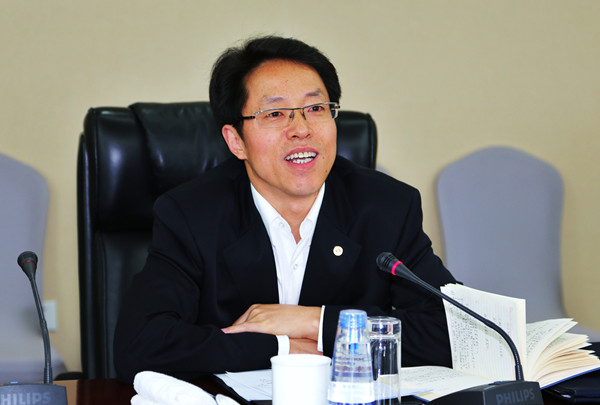The pro-Beijing Sing Pao newspaper ran a front page “advertisement” on Friday calling upon a fictional character “Zhang Xiaoming” to explain himself to Beijing in ten days, or his ties to Beijing will be cut.
Although the “Xiao” character in the name of the fictional character is different from that of China Liaison Office Director Zhang Xiaoming, the advertisement unequivocally refers to the director of Beijing’s powerful organ in Hong Kong.

The advertisement describes “Zhang Xiaoming” as a 53-year-old man from Taixing, Jiangsu province – the same as the Liaison Office director.
The feature was formatted as an ultimatum signed by “Grandpa from Beijing,” who asked his “grandson Xiaoming” to return to Beijing and explain himself by October 24. “Otherwise, our relationship will be over,” it said. “Grandpa” is a common term used by people in Hong Kong to refer to the Chinese government.
It said Zhang had been “on the wrong path” by “teaming up with a villain called Wolf Ying” – a nickname for Chief Executive Leung Chun-ying – during his four years living in the city.
“[You lot] have been organising a syndicate, gaining private interests, bullying the weak, promoting Hong Kong independence, and harming the interests of society,” the feature said.

Sing Pao earlier wrote in an anonymous commentary suggesting that the Liaison Office had been expanding its network of cronies in Hong Kong and meddling in the territory’s affairs. It also accused Leung, Zhang and Jiang Zaizhong, the chairman of two Beijing mouthpieces in Hong Kong, of trying to destabilise the territory by permitting the pro-independence camp to expand.
See also: Rivals of Xi encourage meddling by China Liaison Office in Hong Kong, pro-Beijing newspaper claims
Friday’s advertisement said that it had hoped Zhang would reflect on his conduct and take responsibility following its previous feature published last month. “Unfortunately, you were indifferent and insist on being yourself,” it said.
‘Big mole’
It said that Zhang chose to rely on the power of another fictional character “Big Mole” – referring to senior official Zhang Dejiang, who has a mole on his forehead – and go against the wishes of his “family.”
Sing Pao earlier accused Zhang, an ally of ex-leader Jiang Zemin, of resisting the Chinese Communist Party and permitting his political syndicate such as the Liaison Office to continue corrupt practices across China.
“You have hugely disappointed your family by disregarding the family rules of integrity and self-discipline, and ignoring the country’s political ideology and priority given to the interests of the whole,” said the advertisement.

The advertisement did not specify what consequences “grandson Xiaoming” would face if he did not return to Beijing by October 24.
Since late-August, Sing Pao has been running anonymous commentaries on its front pages attacking Hong Kong’s leader and the China Liaison Office. It has urged the Central Commission for Discipline Inspection, China’s powerful anti-graft organ headed by President Xi’s ally Wang Qishanto, to investigate the Liaison Office.
The move has led to speculation that Xi is preparing to eradicate a powerful sector within the Communist Party.
Last week, the newspaper cited threats from the Liaison Office and Shenzhen public security, but said it would continue to be “faithful to the truth.”
On Thursday, it accused independence-leaning party Youngspiration of being a “fake pro-independence group” backed by the political syndicate of the China Liaison Office and Leung, after Youngspiration lawmakers Yau Wai-ching and Sixtus Leung Chung-hang insulted China in Wednesday’s oath taking. The newspaper ran a front page stating a similar position in early September.
